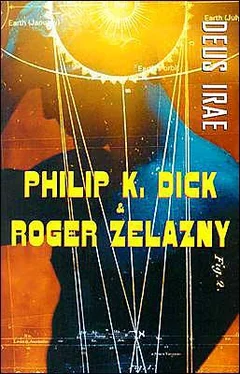To Earl, Tibor said, “Why is it so hostile?”
Immediately coarse clouds of black issued forth from the underground reality which was the autofac. “I’m not hostile!” the bullhorn honked with wrath. “You goddamn lying son of a bitch.” A hiss, like steam released in an emergency overload, and then a huge crashing roar, as if a tone of garbage-can lids had been upset by raccoons. Then—silence.
“I think you killed it,” the smallest of the runners said to Earl.
“Christ,” Earl said, witty disgust. “Well, it probably couldn’t have helped you anyhow.” His voice quavered, then. “It would appear that I have screwed everything up. I wonder what we do now.”
Tibor said, “I’ll continue on my way.” He flicked the cow with a manual extensor; the cow mooed, granted, and slowly resumed its march, back in the direction from which they had come.
“Wait,” Earl said, raising a furred hand. “Let’s try once more.” He searched in his tunic, and brought forth a notepad and a ballpoint pen of prewar vintage. “We’ll submit our request in writing, like they used to do. We’ll just drop it down into the hole. And if that don’t work, we’ll give up.” He painfully, slowly scribbled on the notepad, then tore the top page off, and walked slowly toward the inert entrance to the subsurface autofac.
“Once warned twice burned,” the smallest of the runners piped.
“Forget it,” Tibor said to the runners; again he nudged the cow electronically, and he and she moved off, groaningly, the dry wheel bearings of his cart clacking noisily.
“The trouble may have existed in the bullhorn,” Earl said, still trying to knit the situation together. “If we bypass that—”
“Goodbye,” Tibor said, and continued on.
He felt melancholy. A soothing sort, a land of inner peace. Had the runners managed that? He wondered. They were said to…the big runner Earl had radiated anything but peace, however. Very strange, he thought; the runners are like the calm eye of the storm that everyone talks about but which no one sees. Peace in the center of chaos, perhaps.
As his cart lumbered on, pulled by his tireless cow, Tibor began to sing.
Brighten up the corner where you are…
He could not remember how-the rest of the old hymn went, so he tried another.
This is my father’s world. The
rocks and trees, the wind and
breeze…
That didn’t sound right. So he tried the Old One Hundred, the doxology:
Praise him from whom all blessings flow.
Praise him ye creatures here below.
Praise him above, ye heavenly host.
Thank Father, Son and Holy Ghost.
Or however it was that the hymn went.
He felt better, now. And then all at once he realized that his wheel bearing had stopped complaining. He peered down, and saw the grim news: the wheel had entirely stopped turning. The bearings had seized up.
Well, thus it goes, he thought as he reined the cow to a halt. This is as far as we go, you and I. He sat listening to the sounds around him, noises from the trees and shrubbery, little animals at work, even smaller ones at play: the offspring of the world, maimed and grotesque as they might be, had the right to frolic about in the warm morning sun. The owls had retired; now came the red-tailed hawks. He heard a far-off bird, and was comforted.
The bird sang words, now. Brighten up the corner, it called. Again it sang the few words, and then trilled out, Praise Him from whom the wing and trees, the rocks and thank you. Tweet, toodle. It started from the beginning again, tracing each previous outburst.
A meta-mutant bird, he realized. A teilhard de chardin: forward oddity. Does it understand what it sings? he wondered. Or is it like a parrot? He could not tell. He could not go that way; he could only sit. Damn that wheel bearing, he said savagely to himself. If I could converse with the meta-bird maybe I could learn something. Maybe it has seen the Deus Irae and would know where he is.
Something at his right lashed the bushes, something large. And now he saw—saw and did not believe.
A huge worm had begun to uncurl and move toward him. It thrust the bushes aside; it dragged itself on its own oily slime, and as it came toward him it began to scream, high-pitched, strident. Not knowing what to do, he sat frozen, waiting. The rivulets of slime splashed over tarnished gray and brown and green leaves, withering both them and their branches. Dead fruit fell from the rotting trees; there arose a cloud of dry soil particles as the worm snorted and swung its way toward him. “Hi there!” the worm shrieked. It had almost reached him. “I can kill you!” the worm declared, tossing spit and dust and slime in his direction. “Get away and leave me! I guard something very precious, something you want but cannot have. Do you understand? Do you hear me?”
Tibor said, “I can’t leave.” His voice shook; with his trembling body he engineered a quick movement; he brought forth his derringer once more and aimed it at the cranium of the worm.
“I came out of garbage!” the worm cried. “I was spawned by the wastes of the field! I came from your war, inc. It is your fault that I am ugly like this. You can see the ugliness about me—look.” Its straining head wove and bobbed above Tiber’s, and now a shower of slime and spit rained down on him. He shut his eyes and shuddered. “Look at me!” the worm shouted.
“Black worm,” Tibor grated; he fooled with the derringer, aimlessly. And squinched down to avoid what had to come. It would bite his head off; he would die.
He shut his eyes, and felt the forked tongue of it lap at him.
“I am poisoning you,” the worm declared shrilly. “Sniff the odor of my great eternal body. I can never die; I am the Urworm, and I will exist until the end of the Earth!” Coils of its body splashed forward, spilling over his cart, over the cow, over himself. He snapped on the electric field of his cart, a last-ditch, hopeless effort to protect himself and the cow. The field hummed and buzzed; it crackled with shimmering sparks, and, all at once, the head portion of the worm retreated.
“Did I get you?” Tibor said, with hope. “Can’t you endure a five-amp electrical charge?” He snapped the dial to peak power; now the field sparked wildly, sending out cascading handfuls of light.
The head of the worm drew far back, to strike. This is it, Tibor realized, and held up the derringer. The head slithered forward and the great beak of the thing crashed through the five-amp field at Tibor.
As it revealed its fangs the electrical field made it pause; it halted its forward motion. Looking up, Tibor saw the soft underside of its throat, and he fired the derringer.
“I want to sleep!” the worm howled. “Why do you disturb my rest?” It jerked back its head, lifted it high, saw the blood dripping down onto itself. “What have you done?” it demanded. It swooped at him once again. He reloaded the derringer, not looking up until he had swung the barrel back into place.
Once more the head descended,. Once more he saw up at the soft underside of its throat. Again he fired.
“Let me be!” the worm cried out in pain. “Leave me to my sleep upon my possessions!” It reared up, and then, with a tremendous crash, descended to strike the ground. Its heaping coils spread out everywhere; the worm breathed hoarsely, its glazed eyes fixed on Tibor. “What has been done to you,” the worm snarled, “that has caused you to murder me? Have I done any act against you, any crime?”
“No,” Tibor said. “None.” He could see that it had been badly hurt, and his heart stopped laboring. Again he could breathe. “I am sorry,” he said insincerely. “One of the two of us had to—” He paused to reload the derringer. “Only one of us could live,” he said, and this time shot the worm between its lidded eyes. The eyes grow and contract, he noticed. Bigger, brighter… then paling out to mere glimmers. Mere decay. “You are dead,” he said.
Читать дальше








